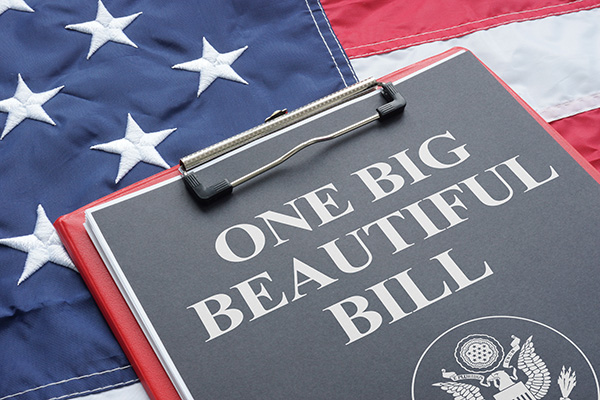The Impact of the One Big Beautiful Bill Act on University Professionals

With the signing of the One Big Beautiful Bill Act (OBBBA) on July 4, 2025, several provisions from the Tax Cuts and Jobs Act (TCJA) of 2017 have now become permanent. The law also introduces some new provisions that can directly affect the tax situation of academics. Becoming familiar with the new legislation is important for maximizing the year’s tax planning and helping to eliminate surprises come tax time.
Permanent TCJA Tax Brackets
The OBBBA has made the current tax brackets from the TCJA permanent, ending speculation about a return to a pre-TCJA system in 2026. The current, and now permanent, tax brackets are: 10%, 12%, 22%, 24%, 32%, 35%, and 37%.
Deductions
Itemized Deductions
One of the most impactful changes in the OBBBA is the increase to the state and local tax (SALT) deduction cap as it went from $10,000 to $40,000 per year. This change applies to single and joint filers with a modified adjusted gross income (MAGI) of $500,000 or less. The deduction begins to phase out for taxpayers with income above this threshold.
Other key provisions affecting itemized deductions include mortgage interest and charitable contributions. The OBBBA permanently extended the mortgage interest deduction limit to the first $750,000 of home acquisition debt. It also established a new rule: charitable contributions are subject to a 0.5% adjusted gross income (AGI) floor for those who itemize their deductions. Only contributions that exceed this floor will be deductible starting in the 2026 tax year.
Standard Deductions
Even with the higher SALT cap, many academics are likely to take the standard deduction. Without substantial SALT, mortgage interest, and charitable gifting, it can be difficult to surpass the standard deduction amount. The standard deduction is set to increase to $15,750 for single filers and $31,500 for joint filers for the 2025 tax year. Future increases to the standard deduction will be indexed annually for inflation.
Enhanced Senior Deduction
The enhanced senior deduction provides a temporary increase for taxpayers age 65 and older: up to $6,000 per individual or $12,000 for joint filers, in addition to the itemized or standard deduction.
This benefit applies only to the 2025 through 2028 tax years and is subject to income phaseouts. This enhanced deduction phases out by 6% of the (MAGI) between $150,000 to $250,000 for joint filers and from $75,000 to $175,000 for single filers.
Charitable Deductions
Starting in 2026, taxpayers can deduct certain charitable contributions even if they take the standard deduction: $2,000 for joint filers and $1,000 for single. This allows charitably inclined academics to receive some tax benefits without itemizing.
Other Provisions
Qualified Business Income Deduction (Section 199A)
For university professionals with a sole proprietorship, S corporation, or other entity eligible for a qualified business income deduction, the OBBBA permanently extended the 20% qualified business income deduction and raised the phaseout threshold to $150,000 for joint filers and $75,000 for single filers. This may affect academics who earn consulting or certain royalty income.
Clean Energy Credits
Several of the clean energy credits introduced in the Inflation Reduction Act will be eliminated by the end of 2025. This includes the clean vehicle credit, most residential clean energy credits, and new energy-efficient home credits.
At approximately 1,000 pages, the OBBBA contains many additional provisions that may affect academics. Consulting with a tax professional to understand the full scope of how the legislation impacts one’s tax situation is a key piece ineffective planning.

